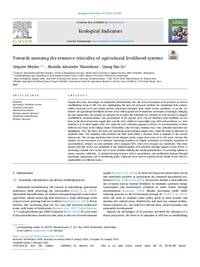Towards assessing the resource criticality of agricultural livelihood systems

Authors:
Despite the many advantages of sustainable intensification (SI), the level of adoption of SI practices in African
smallholding farms is still very low, highlighting the need for adequate methods for monitoring farm sustainability. Research on SI and related poverty alleviation strategies focus either on the “problems” or on the “solutions” for agricultural livelihood systems (ALS) with separate sets of indicators developed accordingly. Bridging the two approaches, we propose an indicator set to assess the criticality of a resource to ALSs in order to support smallholders, decision-makers, and practitioners in the process of SI. The set indicates what problems an ALS faces in the form of resource supply risks and the ALS’s ability to successfully cope with such problems, i.e., how resilient it is to these supply risks. We apply the ALS criticality approach (ALSCA) to macronutrients in three different ALS types in the village cluster of Pontieba, Ioba Province, Burkina Faso. Two criticality indicators are highlighted. First, the three ALS types are not facing equal nitrogen supply risks, when the latter is informed by depletion time. The depletion time indicates the time until which a resource stock is depleted at the current mining rate. The average depletion time of soil nitrogen stocks ranges from some 10 to 165 years. Second, the reliance on own resources is an indicator measuring resilience to supply restriction. In Pontieba, regardless of macronutrient, reliance on own nutrients never surpasses 50% when ALS averages are considered. The study showed that the ALSCA can contribute to the implementation of SI practices through support at four levels: 1) providing a holistic view on the ALS to avoid problem-shifting and enable prioritization, 2) providing options to reduce resource criticality, 3) mutual learning between ALSCA practitioners and smallholder farmers through knowledge integration, and 4) facilitating policy coherence from local to national levels thanks to the ALSCA’s applicability on different scales.
